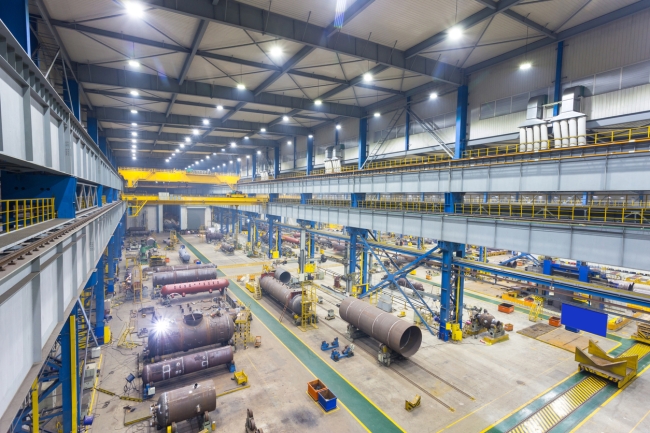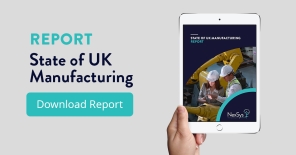5 minute read • published in partnership with NexSys
Insight: Sustainability and Innovation – How tech is making UK manufacturing greener
Climate change is arguably one of the defining issues of our time. How we respond to it, and the action we take to mitigate it over the coming years will do much to shape our long-term future, including the way we do business.
Although all industries and sectors – as well as consumers – have their role to play in creating a more sustainable world, manufacturing has a particularly important part. In particular, it needs to find ways of cutting waste, reducing emissions and sourcing supplies from more sustainable sources.
There have already been real and continuous improvements in recent years, assisted by the advent of new technologies which have helped to substantially reduce inefficiencies. There are also, it should be noted, potential cost benefits to sustainable practices – providing an added incentive.
NexSys’ State of UK Manufacturing Survey aimed, among other things, to get a better understanding of what UK manufacturers were doing to enhance their own environmental sustainability. In this blog, we’ll look at the steps they’re taking and what more has yet to be done.

Picture: Getty/iStock
Barriers to sustainability
Our report asked a group of UK manufacturers what they thought were the biggest barriers to enhanced sustainability in the industry. Cost factors were the biggest issue; 57.14% cited the cost of greener technology, while 60.7% pointed to increased energy prices.
Just under half (48.2%) felt that lack of expertise was a major roadblock to enhancing manufacturing sustainability, and 30.4% cited technical barriers. In addition, 16.1% believed that the existing framework for monitoring and evaluation was inadequate for the task.
In our interviews for the report, one customer explained that increased costs were a major hurdle to improved environmental sustainability. However, despite this, they recognise that greater sustainability is “the right thing to do” for society as a whole, and for future generations.
“One of the main barriers is around cost; to make a product completely sustainable costs [money],” they said. “We have big seasonal changes that come through – 30% of the business is around gifting at Christmas, and that was all plastic – [and] the decision was made to remove all plastic from the packaging.
“We had to find new suppliers and there was cost involved in this. So the hurdle was [that] we were potentially going to make less money doing this, but it is the right thing to do.”
The impact of technology
A clear majority of the manufacturers polled as part of our State of UK Manufacturing survey agreed that technology was helping the industry to become more sustainable. Nearly three quarters of respondents (71.4%) agreed with this notion.
When asked how tech was making manufacturing more environmentally friendly, nine out of 10 participants (90%) said that it had helped to improve efficiency and reduce waste. Nearly six out of 10 (57.5%) said it had facilitated more integrated production processes, while just below half (47.5%) said it had enabled more sustainable sourcing of materials.
Also, 37.5% of those surveyed said that technology had helped to make supply chains more efficient. Only 7.5%, however, felt that it had made regulatory compliance easier.

Picture: Getty/iStock
Regulatory flexibility and clarity
As part of our survey, we asked participants about the regulatory burden associated with sustainability. Just under one fifth (19.6%) wanted to see tougher enforcement of environmental regulations, and only 17.9% felt that stricter regulatory requirements should be imposed on the industry.
There was, however, an apparent desire for clearer government regulation and for a greater degree of leeway to help manufacturers make the transition to greener production. A majority of respondents (53.6% and 51.79% respectively) said they wanted to see greater regulatory flexibility to help manufacturers adapt and also greater clarity around regulatory requirements.
“We supply to the NHS and public bodies, and are driven by requests about green credentials. We are trying to move away from plastics to more sustainable materials,” said one customer. “However, the trouble with that is because of the nature of the products we make and the environment we are in, and changes in regulations [for] supplying to the EU, every change we make costs a fortune.”
Just over a fifth (21.4%) of those who took part in our survey said that they would like to see the government impose stronger sustainability criteria for public sector contracts. Just 1.8% of those surveyed said that the government should provide direct funding for sustainability measures.
The support manufacturers need
NexSys’ State of UK Manufacturing survey provides us with a useful overview of the state of play in UK manufacturing when it comes to sustainability, and also gives us a revealing snapshot of what companies in the sector are doing to adapt to the environmental challenges facing them.
Of course, there remains considerable uncertainty about the impact climate change is likely to have on the sector, and on the economy and society more broadly. When asked whether they thought climate change would impact their ability to source supplies, for example, 39.3% said they did not know, while 42.3% said they felt that it would not and 17.9% said they expected that it would.
There is, however, a clear willingness on the part of UK manufacturing to do its bit to help mitigate climate change and reduce carbon emissions. While relatively few manufacturers believe that tougher regulation and enforcement are the answer, they do want to see the government help them by providing greater regulatory transparency and flexibility as they seek to adapt.
With the recent election of a labour government, manufacturers will be looking for signs that they have taken this on board. In particular, they will want to be sure that any policies relating to climate change have the required flexibility built in so that they can do their part to support the transition to a cleaner economy while also spurring economic growth.

